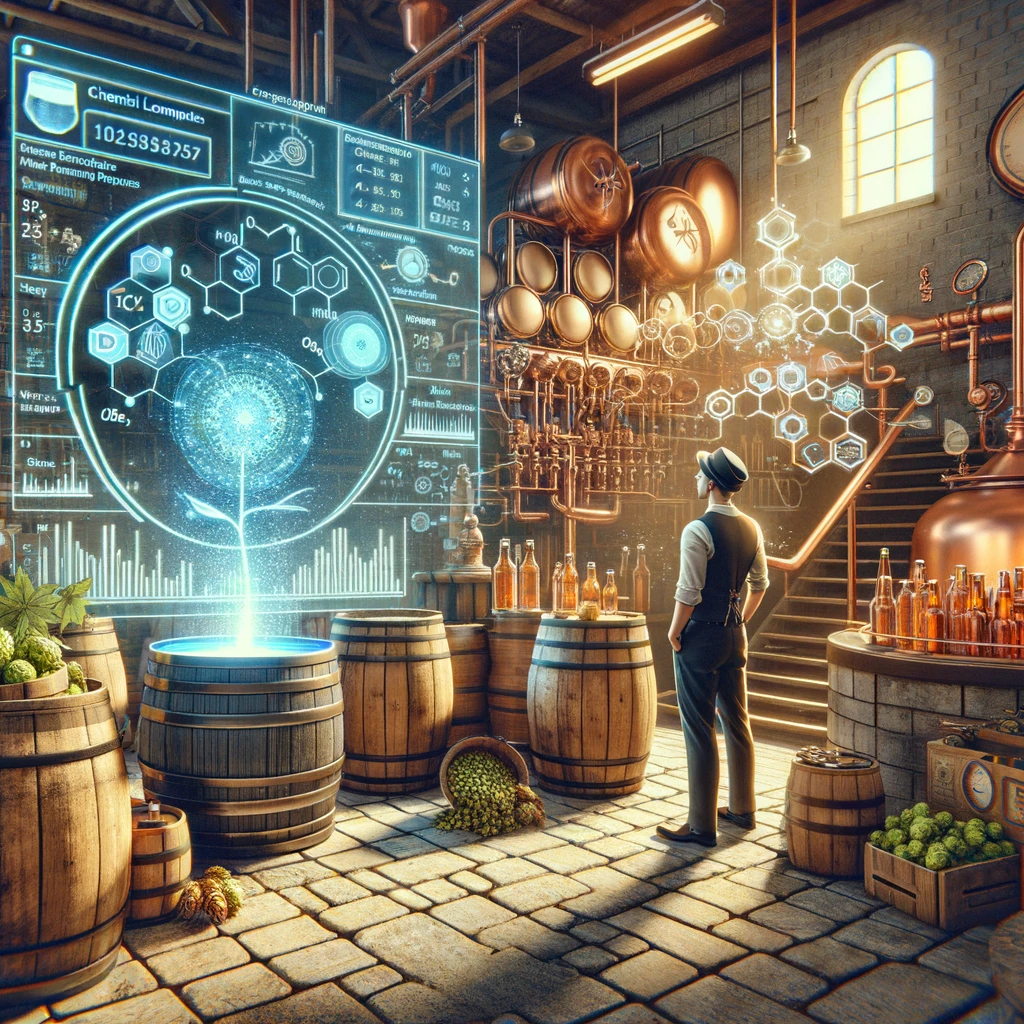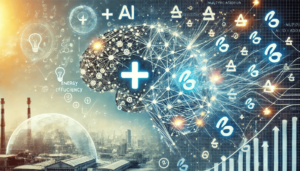The Future of Flavor: Machine Learning’s Role in Brewing Better Beer

A traditional brewer stands amidst wooden barrels and copper kettles, engaging with a modern holographic display showcasing the advanced machine learning insights into beer flavor enhancement.
- How is machine learning revolutionizing the traditional beer brewing process?
- What are the potential benefits of integrating data-driven insights into flavor enhancement?
- How does the fusion of traditional brewing techniques and modern technology pave the way for a new era of personalized beer experiences?
The quest for the perfect pint of beer has traditionally blended art with science. Today, a revolutionary approach introduced by a recent study on Nature Communications suggests the future of beer flavor might lie in the intersection of brewing tradition and machine learning technology. This innovative development promises a new frontier where data and algorithms enhance our understanding and creation of beer flavors, inviting us to reconsider the essence of brewing excellence.
Exploring the Complexity of Beer Flavors
The journey to understanding beer’s complex flavor profile is a quest that unites beer connoisseurs and scientists alike. The allure of beer comes from its vast spectrum of tastes and aromas, a direct reflection of the diverse ingredients and the intricate brewing processes employed. The study delves deep into this enigmatic world, embarking on an exhaustive analysis of various beers to unearth the specific chemical compounds that craft their distinct flavors.
This endeavor goes beyond merely cataloging these flavors. It leverages the power of machine learning with a dual aim: to predict the sensory impact of these compounds accurately and to explore ways of enhancing them to meet individual preferences. Such an approach does not only illuminate the science behind beer’s appeal but also opens the door to a future where brewing can be personalized. It invites us to imagine a world where each beer is a masterpiece of tailored perfection, reflecting the personal tastes and preferences of its consumers.
By mapping out the intricate dance of flavors within each beer, this effort sheds light on how subtle variations in chemical composition can alter sensory experiences. It sets the stage for an exciting era of brewing where tradition meets innovation, allowing brewers to experiment with confidence and consumers to embark on personalized flavor journeys. This exploration of beer’s complex flavors is a testament to the potential that lies at the intersection of culinary art, science, and technology, promising a future where every sip is a discovery.
Unlocking Beer’s Flavor Complexity with Data
The integration of machine learning into the craft of brewing marks a revolutionary shift, propelling flavor science into a new era of precision and personalization. Traditional approaches to flavor development, relying heavily on subjective taste testing and empirical brewing knowledge, have been invaluable but inherently limited by human perception and the complexity of flavor chemistry.
Enter the era of machine learning—a transformative force equipped with analytical prowess that far exceeds traditional methodologies. Using sophisticated models such as Gradient Boosting, this approach mines and interprets complex datasets of chemical properties and their corresponding sensory perceptions, uncovering the nuanced relationships between a beer’s chemical makeup and its flavor profile. This not only reveals the subtle influences of various compounds on taste but also enables the creation of beer flavors with an unprecedented level of detail and customization.
This leap in technology allows brewers to accurately predict the impact of minute adjustments in chemical compositions, facilitating the crafting of beers that cater to a broad spectrum of consumer preferences. Machine learning enriches the brewer’s artistry, providing a robust toolkit for innovation while retaining the essence of traditional brewing. The synergy between age-old brewing techniques and cutting-edge data analysis heralds a future where every beer can be a unique experience, meticulously designed to delight the palate.
A pivotal aspect of this technological evolution is the meticulous analysis of beer’s flavor constituents, as demonstrated in the comprehensive study of 250 commercial beers. By examining over 200 distinct chemical properties per beer, researchers illuminated the vast landscape of flavors that define the brewing world. Notably, a substantial portion of these properties were identified as terpenoids and yeast metabolites—key players in imparting the herbal, fruity, and solvent notes characteristic of many beloved beers.
This data-driven exploration went beyond mere analysis; it empowered researchers to pinpoint specific, previously overlooked compounds that play critical roles in shaping beer’s flavor. By fine-tuning the concentration of these compounds, the study achieved significant enhancements in the flavor profiles of both alcoholic and non-alcoholic beers, as validated by consumer feedback. This achievement underscores the potential of machine learning and data analytics to not only understand but actively improve the sensory qualities of beer.
This marriage of data science with traditional brewing wisdom opens unprecedented avenues for innovation, enabling the creation of beer varieties finely tuned to meet the evolving tastes of consumers worldwide. It represents a significant stride toward perfecting beer flavor, leveraging comprehensive chemical insights to explore new dimensions of taste and aroma.
Implications for the Food Industry and Beyond
The integration of machine learning into the realm of flavor science is not merely a milestone for the brewing industry; it epitomizes a transformative shift that could sweep across the entire food and beverage sector. This innovative approach heralds the advent of an era where customization and precision take center stage in flavor development, transcending traditional methodologies. By leveraging the predictive power of machine learning to decipher and optimize flavor profiles, the industry stands on the brink of a revolution capable of producing foods and beverages that are not just universally appealing but are also tailored to meet the nuanced tastes and preferences of individual consumers.
This transition toward data-driven flavor enhancement is poised to redefine our culinary landscapes, offering an unprecedented level of personalization in dining experiences. From craft beers that cater to the specific palate preferences of beer enthusiasts to gourmet dishes designed around the subtle flavor inclinations of diners, the possibilities are vast and varied. Beyond merely enhancing taste, this approach promises to influence nutritional profiles, allergen management, and even food production sustainability, marking a significant leap forward in how we conceive, experience, and enjoy food and beverages.
As this trend gains momentum, it could catalyze a wave of innovation across the food industry, encouraging businesses from small artisanal producers to multinational corporations to embrace the potential of machine learning in crafting the future of food. This is more than a technological evolution; it’s a cultural shift towards a future where the flavors we savor are as much a product of algorithms and analytics as they are of soil and season.
The Ethical and Societal Considerations of AI in Brewing
As we stand on the brink of integrating machine learning into the brewing process, it’s paramount to address the ethical and societal implications this technological revolution may bring. The advent of AI in brewing opens exciting possibilities for innovation and personalization but also poses significant challenges that must be carefully considered and managed.
Impact on Employment
One of the primary concerns is the potential impact on employment within the brewing industry. While AI can enhance efficiency and innovation, there’s a valid concern about job displacement. It’s essential to explore how these technologies can complement human skills rather than replace them. Providing training and education for brewery workers to adapt to new roles in an AI-enhanced workflow could mitigate these concerns, ensuring that the brewing industry remains a source of livelihood for many.
Consumer Privacy
The use of machine learning models, particularly those that tailor flavors to individual preferences, raises questions about consumer data privacy. Collecting and analyzing consumer taste preferences necessitates handling sensitive personal information. Therefore, brewers and tech developers must implement robust data protection measures, ensuring that consumers’ privacy rights are respected and that their data is used ethically and securely.
Authenticity of Flavors
Another consideration is the authenticity of flavors that AI-driven processes might produce. While the ability to fine-tune flavors using chemical compounds offers the potential for unparalleled variety, it also raises questions about the naturalness and authenticity of these flavors. It’s important to maintain a dialogue with consumers about the methods used to achieve these flavors, emphasizing transparency, and maintaining trust in the products’ integrity.
Balancing Innovation with Ethical Considerations
Ultimately, the key to successfully integrating AI into brewing lies in balancing the drive for innovation with ethical considerations. This involves engaging with stakeholders across the spectrum—from brewers and consumers to regulators and ethicists—to forge a path forward that leverages the benefits of AI while addressing potential drawbacks and concerns. By fostering an environment of open dialogue and collaboration, the brewing industry can navigate these ethical waters, ensuring that the future of beer is not only flavorful but also responsible and inclusive.
Envisioning the Future: From Craftsmanship to Data Craft
The integration of AI into the brewing process marks a significant evolution from traditional craftsmanship to a new era of ‘data craft’, where the precision of algorithms complements the human touch in creating beer. This transformation invites us to envision a future where the artistry inherent in brewing is not lost but enriched by the capabilities of machine learning.
In the future, brewers can harness the power of data to understand the subtle nuances that define the taste preferences of diverse audiences. Machine learning doesn’t replace the brewer’s intuition but augments it with insights derived from analyzing vast datasets of flavor profiles and consumer feedback. This symbiosis between human creativity and AI’s analytical prowess promises to elevate the beer-drinking experience to new heights, offering consumers beers that are not only high in quality but also personalized to their unique tastes.
Moreover, this shift towards data craft opens the door to innovation in flavor development and sustainability practices. AI can identify patterns and propose combinations of ingredients that may never have been considered, leading to the discovery of new flavors and styles. Additionally, by optimizing brewing processes for efficiency, machine learning can play a crucial role in reducing waste and energy consumption, contributing to a more sustainable brewing industry.
However, as we journey further into this data-driven future, it remains imperative to preserve the essence of brewing as an art form. The challenge lies in ensuring that technology serves to enhance the creative process, not diminish it. By maintaining a dialogue between the traditions of brewing and the innovations of technology, the industry can strike a balance that respects the heritage of beer-making while embracing the possibilities of the digital age.
In this envisioned future, the convergence of craftsmanship and data craft heralds a new chapter in the history of brewing. It’s a chapter characterized by a richer understanding of flavors, more personalized consumer experiences, and an unwavering commitment to sustainability and innovation. As we stand on the cusp of this exciting frontier, the potential to redefine our relationship with one of the world’s oldest and most cherished beverages is immense. The journey from craftsmanship to data craft in brewing is not just about enhancing beer but about enriching the human experience, one pint at a time.
A Call to Action for the Brewing Community
As the brewing industry finds itself on the cusp of a digital renaissance, it faces a unique and exciting challenge: how to embrace the revolutionary capabilities of AI without losing the soul of brewing that has been nurtured over centuries. This pivotal moment calls for a collective effort from brewers, technologists, consumers, and policymakers to navigate this new landscape with care, wisdom, and an eye toward the future.
For brewers, both large-scale and craft, this means venturing into uncharted territories of flavor science and data analytics with an open mind and a commitment to maintaining the quality and integrity of their products. It invites an exploration of how AI can not only streamline operations but also deepen the understanding of the subtle interplay of ingredients that give beer its myriad flavors and aromas.
For technologists and AI researchers, it’s an invitation to work closely with the brewing community, sharing insights and tools that can demystify the complexities of machine learning. By fostering partnerships grounded in mutual respect and shared goals, technologists can help ensure that AI solutions are accessible, practical, and aligned with the brewers’ needs and values.
Consumers, on their part, play a crucial role in shaping the direction of this evolution. Their openness to new experiences, coupled with a demand for transparency and authenticity, can guide brewers and technologists in creating AI-enhanced products that honor the tradition of brewing while offering novel and personalized drinking experiences.
Policymakers and industry bodies also have a significant role in ensuring that the integration of AI into brewing is conducted responsibly. By establishing guidelines that encourage innovation while protecting consumer interests and the cultural heritage of brewing, they can provide a framework that supports sustainable growth and ethical practices within the industry.
This call to action for the brewing community is not just about adopting new technologies; it’s about forging a future where the timeless art of brewing meets the cutting-edge science of machine learning. It’s an opportunity to craft beers that delight and surprise, to tell new stories through flavors, and to continue the rich tradition of brewing in an age marked by digital innovation.
Together, by embracing this challenge with enthusiasm and foresight, the brewing community can ensure that the journey into the digital age enriches the world of beer in ways that are inclusive, sustainable, and deeply human. It’s a chance to brew a future where every pint is a testament to the harmonious blend of tradition and technology.




